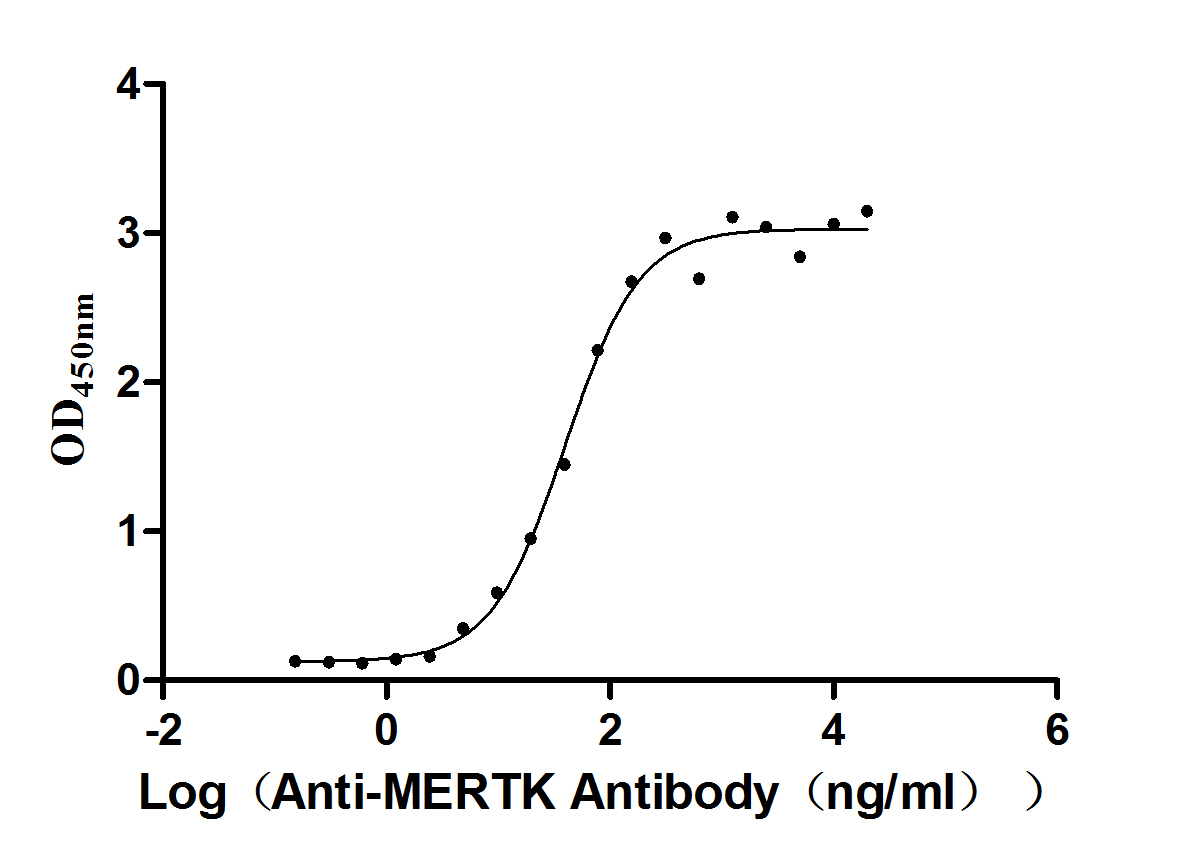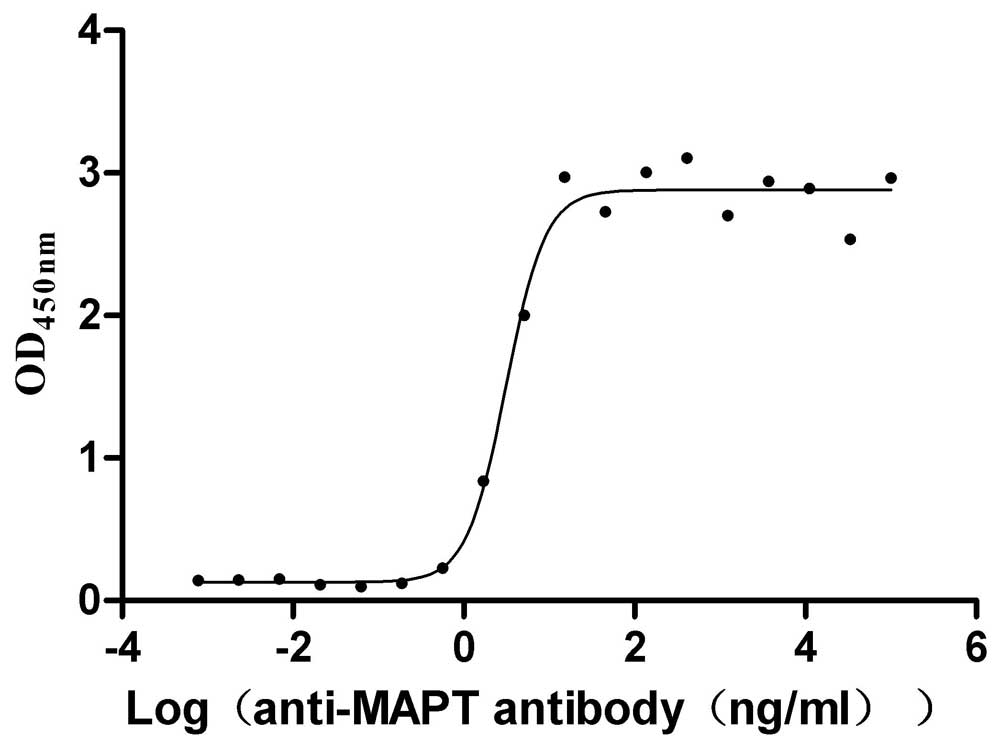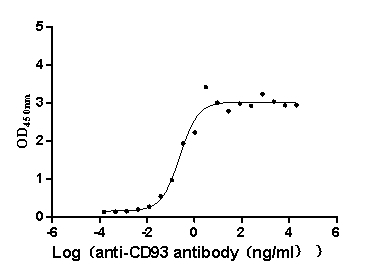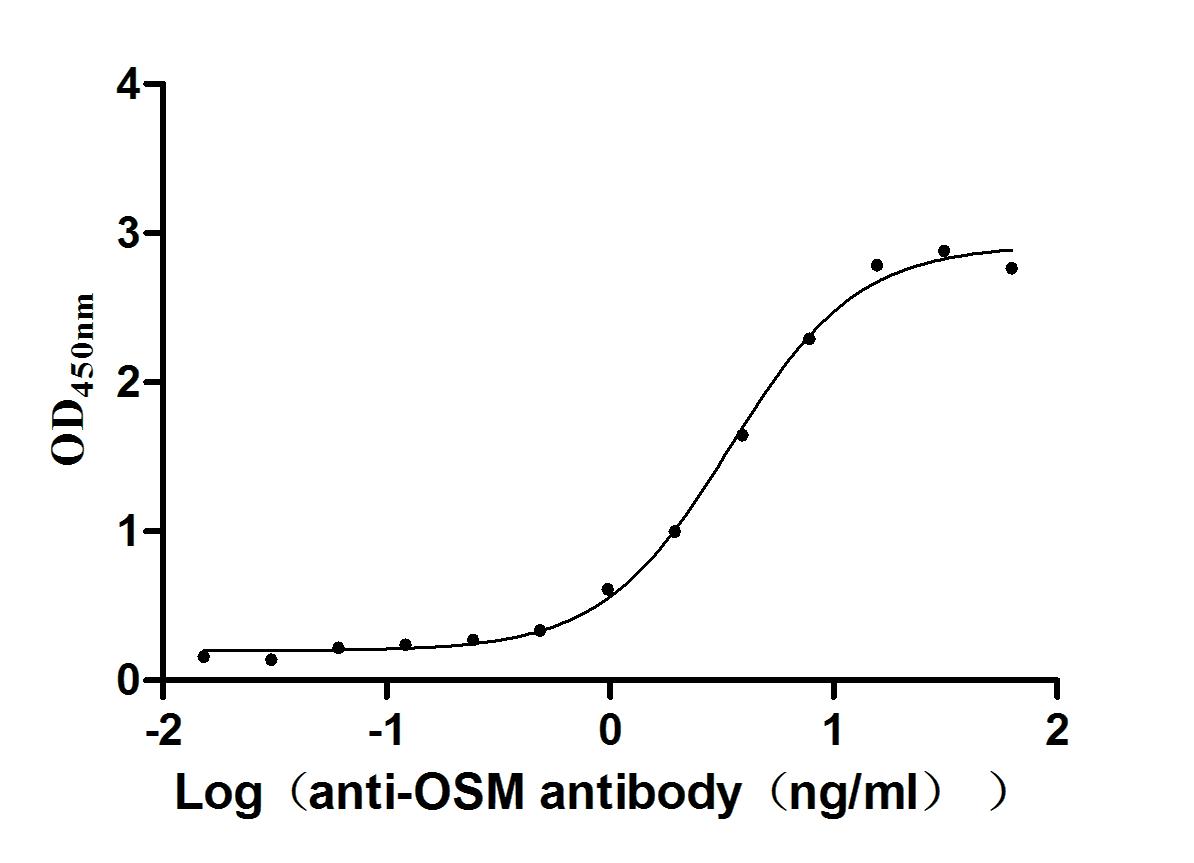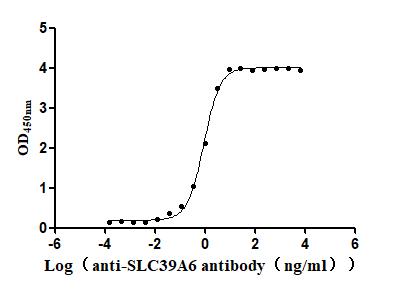Recombinant Mouse Fizzy-related protein homolog (Fzr1)
-
货号:CSB-YP889934MO
-
规格:
-
来源:Yeast
-
其他:
-
货号:CSB-EP889934MO
-
规格:
-
来源:E.coli
-
其他:
-
货号:CSB-EP889934MO-B
-
规格:
-
来源:E.coli
-
共轭:Avi-tag Biotinylated
E. coli biotin ligase (BirA) is highly specific in covalently attaching biotin to the 15 amino acid AviTag peptide. This recombinant protein was biotinylated in vivo by AviTag-BirA technology, which method is BriA catalyzes amide linkage between the biotin and the specific lysine of the AviTag.
-
其他:
-
货号:CSB-BP889934MO
-
规格:
-
来源:Baculovirus
-
其他:
-
货号:CSB-MP889934MO
-
规格:
-
来源:Mammalian cell
-
其他:
产品详情
-
纯度:>85% (SDS-PAGE)
-
基因名:
-
Uniprot No.:
-
别名:Fzr1; Fyr; FzrFizzy-related protein homolog; Fzr; Cdh1/Hct1 homolog
-
种属:Mus musculus (Mouse)
-
蛋白长度:full length protein
-
表达区域:1-493
-
氨基酸序列MDQDYERRLL RQIIIQNENT VPCVSEMRRT LTPANSPVSS PSKHGDRFIP SRAGANWSVN FHRINENEKS PSQNRKAKDA TSDNGKDGLA YSALLKNELL GAGIEKVQDP QTEDRRLQPS TPEHKGLFTY SLSSKRSSPD DGNDVSPYSL SPVSNKSQKL LRSPRKPTRK ISKIPFKVLD APELQDDFYL NLVDWSSLNV LSVGLGTCVY LWSACTSQVT RLCDLSVEGD SVTSVGWSER GNLVAVGTHK GFVQIWDAAA GKKLSMLEGH TARVGALAWN ADQLSSGSRD RMILQRDIRT PPLQSERRLQ GHRQEVCGLK WSTDHQLLAS GGNDNKLLVW NHSSLSPVQQ YTEHLAAVKA IAWSPHQHGL LASGGGTADR CIRFWNTLTG QPLQCIDTGS QVCNLAWSKH ANELVSTHGY SQNQILVWKY PSLTQVAKLT GHSYRVLYLA MSPDGEAIVT GAGDETLRFW NVFSKTRSTK ESVSVLNLFT RIR
-
蛋白标签:Tag type will be determined during the manufacturing process.
The tag type will be determined during production process. If you have specified tag type, please tell us and we will develop the specified tag preferentially. -
产品提供形式:Lyophilized powder
Note: We will preferentially ship the format that we have in stock, however, if you have any special requirement for the format, please remark your requirement when placing the order, we will prepare according to your demand. -
复溶:We recommend that this vial be briefly centrifuged prior to opening to bring the contents to the bottom. Please reconstitute protein in deionized sterile water to a concentration of 0.1-1.0 mg/mL.We recommend to add 5-50% of glycerol (final concentration) and aliquot for long-term storage at -20℃/-80℃. Our default final concentration of glycerol is 50%. Customers could use it as reference.
-
储存条件:Store at -20°C/-80°C upon receipt, aliquoting is necessary for mutiple use. Avoid repeated freeze-thaw cycles.
-
保质期:The shelf life is related to many factors, storage state, buffer ingredients, storage temperature and the stability of the protein itself.
Generally, the shelf life of liquid form is 6 months at -20°C/-80°C. The shelf life of lyophilized form is 12 months at -20°C/-80°C. -
货期:Delivery time may differ from different purchasing way or location, please kindly consult your local distributors for specific delivery time.Note: All of our proteins are default shipped with normal blue ice packs, if you request to ship with dry ice, please communicate with us in advance and extra fees will be charged.
-
注意事项:Repeated freezing and thawing is not recommended. Store working aliquots at 4°C for up to one week.
-
Datasheet :Please contact us to get it.
靶点详情
-
功能:Substrate-specific adapter for the anaphase promoting complex/cyclosome (APC/C) E3 ubiquitin-protein ligase complex. Associates with the APC/C in late mitosis, in replacement of CDC20, and activates the APC/C during anaphase and telophase. The APC/C remains active in degrading substrates to ensure that positive regulators of the cell cycle do not accumulate prematurely. At the G1/S transition FZR1 is phosphorylated, leading to its dissociation from the APC/C. Following DNA damage, it is required for the G2 DNA damage checkpoint: its dephosphorylation and reassociation with the APC/C leads to the ubiquitination of PLK1, preventing entry into mitosis. Acts as an adapter for APC/C to target the DNA-end resection factor RBBP8/CtIP for ubiquitination and subsequent proteasomal degradation. Through the regulation of RBBP8/CtIP protein turnover, may play a role in DNA damage response, favoring DNA double-strand repair through error-prone non-homologous end joining (NHEJ) over error-free, RBBP8-mediated homologous recombination (HR).
-
基因功能参考文献:
- Both catalytic and non-catalytic APC/C-Fzr1/Cdh1-mediated activities of PTEN are required for stalk cells' proliferative arrest. Findings implicate the PTEN-APC/C-Fzr1/Cdh1 hub in angiogenesis. PMID: 26228240
- This is the first report revealing Cdh1 function in adult hematopoiesis and showing a role of Cdh1 in a G2/M checkpoint regulation in vivo PMID: 21255192
- Cdh1 is required to prevent the accumulation of cyclin B1 in terminally differentiated neurons. PMID: 16148219
- Cdh1-APC is an important ubiquitin E3 ligase that modulates muscle differentiation through coordinating cell cycle progression and initiating the myogenic differentiation program PMID: 17601983
- APC/CCdh1 is a master G0/G1 regulator and involved in differentiation and development processes. (Review) PMID: 21497201
- studies uncover a cell-cycle-independent function of Cdh1, establishing Cdh1 as an upstream component that governs Smurf1 activity PMID: 22152476
- These data highlight an important role of Cdh1 in the G2/M transition during placental differentiation. PMID: 23206702
- These findings suggest a role for Cdh1 in regulating the updating of consolidated memories. PMID: 23238556
- The results of this study found the consistent with a role for the APC/C-Cdh1 in fear memory and synaptic plasticity in the amygdala. PMID: 23242419
- APC/C-Cdh1 coordinates cortical neurogenesis and size. PMID: 24301314
- we conclude that APC/C(Cdh1) controls CK1 delta levels to balance proliferation and cell-cycle exit in the developing CNS PMID: 25843713
- The findings of this study define Cdh1-APC and FMRP as components of a novel ubiquitin signaling pathway that regulates mGluR-LTD in the brain. PMID: 25913861
- This study reveals a novel role for Cdh1 in craniofacial development through promoting APC-dependent non-proteolytic ubiquitination and activation of Gsc. PMID: 27126000
- This study showed that , APC/C(Cdh1)-mediated degradation of Rock2 maintains the dendritic network, memory formation, and neuronal survival, suggesting that pharmacological inhibition of aberrantly accumulated Rock2 may be a suitable therapeutic strategy against neurodegeneration. PMID: 28396402
- in the Alzheimer's disease (AD)mouse model APP/PS1, lower cdh1 levels were observed in pyramidal neurons in CA1 when compared to age-matched wildtype mice. In this review, we provide a complete list of APC/C substrates that are involved in the nervous system and we discuss their functions. We also summarize recent studies that show neurobiological effects in cdh1 knockout mouse models. PMID: 28505105
- These observations highlight the relevance of APC/C cofactor Cdh1 activity during G1 to ensure an adequate supply of deoxynucleoside triphosphates to the replisome, prevent replication stress and the resulting chromosomal breaks and, ultimately, suppress tumorigenesis. PMID: 28604743
- results suggest that reduction of FZR1 increases therapeutic sensitivity of B-ALL and that transient rather than tonic inhibition of FZR1 may be a therapeutic strategy. PMID: 28143883
- loss of Cdh1 leads to increased and extended S phase progression possibly due to the upregulation of cyclin D1. PMID: 28322826
- Loss of APC/C(FZR1) activity in the male germline led to both a mitotic and a meiotic testicular defect resulting in infertility due to the absence of mature spermatozoa. PMID: 24553289
- Fzr1 is a surprisingly essential gene involved in the establishment of a single spindle from the two pronuclei in 1-cell embryos as well as being involved in the maintenance of genomic integrity during the mitotic divisions of early mammalian embryos. PMID: 23097041
- This study implicates FZR1 as a major regulator of prometaphase whose activity helps to prevent chromosome nondisjunction. PMID: 22918942
- When a neuronal cell enters S phase, Cdk5 is transported to the cytoplasm where it is ubiquitinated by the E3 ligase APC-Cdh1 PMID: 22654103
- Cdh1-APC appears to play a role in regulating axonal growth and patterning in the developing brain that may also limit the growth of injured axons in the adult brain. PMID: 14716021
- FZR1 activity is required to repress cyclin B1 levels in oocytes during prophase I arrest in the ovary, thereby maintaining meiotic quiescence until hormonal cues trigger resumption PMID: 21270054
- homozygous Cdh1 gene-trapped (Cdh1(GT/GT))embryonic fibroblasts reduced stress fiber formation significantly PMID: 20530197
- These results indicate that Cdh1 is required for preventing unscheduled proliferation of specific progenitor cells and protecting mammalian cells from genomic instability. PMID: 18552834
- Depletion of FZR1 (CDH1), a regulatory subunit of the anaphase-promoting complex/cyclosome that targets cyclin B1 (CCNB1) for ubiquitin-mediated proteolysis, partially restores normal timing of meiotic resumption in oocytes with excess CDC14B. PMID: 19129509
显示更多
收起更多
-
蛋白家族:WD repeat CDC20/Fizzy family
-
数据库链接:
KEGG: mmu:56371
STRING: 10090.ENSMUSP00000114203
UniGene: Mm.24202
Most popular with customers
-
Recombinant Human Tyrosine-protein kinase Mer (MERTK), partial (Active)
Express system: Mammalian cell
Species: Homo sapiens (Human)
-
Recombinant Macaca mulatta Microtubule-associated protein tau (MAPT) (Active)
Express system: Mammalian cell
Species: Macaca mulatta (Rhesus macaque)
-
Recombinant Macaca fascicularis CD93 molecule (CD93), partial (Active)
Express system: Mammalian cell
Species: Macaca fascicularis (Crab-eating macaque) (Cynomolgus monkey)
-
Recombinant Human Oncostatin-M (OSM), partial (Active)
Express system: Mammalian cell
Species: Homo sapiens (Human)
-
Recombinant Human Cadherin-1(CDH1),partial (Active)
Express system: Mammalian cell
Species: Homo sapiens (Human)
-
Recombinant Macaca fascicularis Zinc transporter ZIP6 isoform X1(SLC39A6),partial (Active)
Express system: Baculovirus
Species: Macaca fascicularis (Crab-eating macaque) (Cynomolgus monkey)


